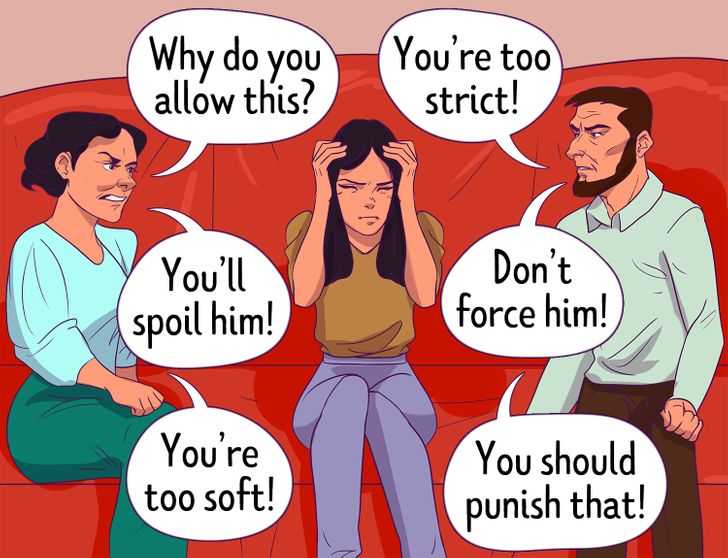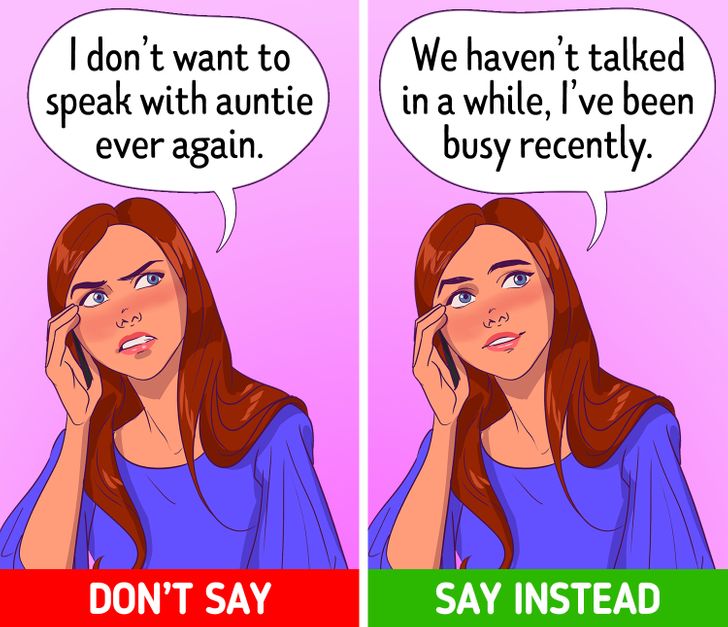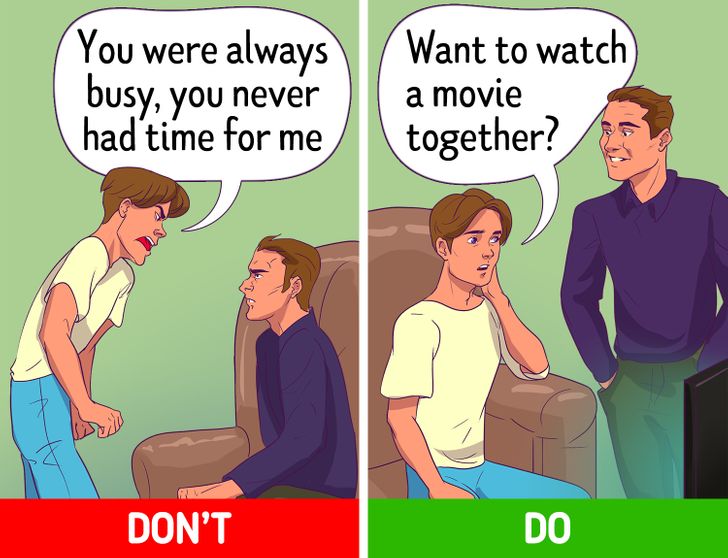I never share my political opinions woth my family because then everybody starts to voice their opinions and then it turns into never-ending arguments🙄✌️✌️
10 Topics to Avoid Discussing With Your Parents If You Don’t Want Them to Backfire on You

If you’re happy to have an open, healthy relationship with your folks, you may feel like letting them into everything about your life. There are, however, situations where their involvement complicates things rather than helps. In these cases, you’re allowed to respond with restraint. If their expectations are invasive, even if they are well-intentioned, it’s OK to draw the line. Remember the golden rule: you can, but you don’t have to.
Bright Side supports healthy boundaries, so we collected some topics that can be too triggering to bring up in conversation with your parent.
1. How to raise your children

Being a parent often feels like surviving amid barely controlled chaos, so an experienced grandparent that can help out can be a lifesaver. But sometimes, grandparents can interfere with your parenting style and actively reset what you worked so hard to create. Listening to critiques is frustrating as well. Child-rearing norms change between generations, so you might find their ideas outdated or even counterproductive.
If you want to ask them for parental advice, go for it. Otherwise, ignore unsolicited suggestions. Nobody can possibly know how to raise your child but you.
2. Your partner’s problems

Be it current difficulties at work, health issues, or character quirks of your partner, it’s better to keep these private from your parents. These things are best discussed privately, without their watchful eye. Otherwise, anything can turn into a cause for speculation, concern, or the inadequate judgment of character, and nobody appreciates that.
Oversharing the details of your partner’s life can be considered a violation of their privacy. They might not want their personal info to be shared with your family and it’s better to not betray their trust.
3. Your relationships with other family members

Household micro-politics are an art, and if you are part of a big family with many opinions and agendas, you’re likely a skilled diplomat. But parents don’t need to curate or even know about your relationships and discussions with other family members, especially if there’s some bad blood between you. Your dealings with your relatives can operate on your terms, rather than be overseen by your parents.
Vagueness is your friend here if explicit boundaries don’t work. “We talk sometimes” is a good deflection tactic.
4. That you didn’t listen to them

Decided to go the other way? Don’t tell them that. It can be hurtful for a parent to know that their child heard their advice and then did the exact opposite. It can be even more hurtful for them to realize that their advice is not something you necessary listen to and stick with. In other words: that you can know best and their opinion is no longer needed.
5. Your lifestyle

There are some aspects of your life that you don’t want to draw your parents’ attention to. Maybe you have an unhealthy diet or a messed-up sleep schedule, or a series of romantic escapades. Or you’re fond of risky sports or aggressive concert raves. For you, it’s just a routine, but for your parents, it can seem like reckless and dangerous behavior. So, you may prefer to deal with some details of your life by yourself.
6. Their parental mistakes

Nobody is perfect and your parent probably did something that hurt you as a child. Childhood trauma can run deep and have a great impact on your life. No need to rub that in your parents’ faces. You don’t want to subject them or yourself to the pain of reliving that experience or the pain of knowing that they hurt you. Instead, compliment them on the positive things they did and tell them you appreciate it.
7. Conflicts in your relationships

All couples fight sometimes, and this is normal. However, it is unwise to run and complain to your parents about how your significant other did you wrong. Today you fight, tomorrow you make up and move on, whereas your parents probably won’t. What, for you, was a minor quarrel can ruin your S.O. in their eyes forever. Parents are protective, so don’t bring them into your tension with your partner.
- Note: We are not talking about extreme situations here, of course. If you are the victim of domestic abuse, you absolutely must tell your parents about it.
8. Spending money

You may spend money in ways your parents don’t understand — or approve of. It can be frustrating for working, self-sufficient adults to receive unrequested advice on how to manage things, which can lead to disagreements and arguments. Your spending habits are not something your parents should critique or comment about, as long as you’re self-supporting and not asking for extra cash from them.
9. Mental health

Mental health is a difficult topic and normally your loved ones should know what’s going on with you. Unfortunately, oftentimes parents simply aren’t qualified enough to have a discussion about it. All they would know is that something is wrong but they have a very loose idea of what. They switch to panic mode. It causes stress to both parties and won’t do anything for your particular mental health status.
Sure, you may share struggles with them if they can support you, but there’s no obligation for your intimate mental details to be part of their world. It’s always better to reach out to a professional with your particular condition.
10. Your career plans

Say, you have an alright job with a bank but want to change it to something completely different, for example, design. It’s gonna be a long and rocky road: you have to learn so much, find a new place, and build yourself a reputation there. You share this desire with your parents and suddenly, a lot of worries start floating around.
You have to explain why you want it and reassure them that you’re ready to take the risks, but there’s no guarantee they’ll understand. Conversations about what happens next might make you feel anxious, pressured, and crushed by the weight of their expectations. So, it might be better to inform them with good news after all deals are sealed.
What are the topics you, personally, would prefer to not discuss with your parents?
Comments
hi
also discussing your relationships with other family members is a bad idea because some of them get jealous of the attention you give to others, in my family it's always the case
i believe family members are those who need to help with your the mental, not to judge
no need to avoid them
Related Reads
19 Photos That Prove Kids Make This World a Better Place

15 Reasons Why Children Are a Mixed Bag of Laughter and Mischief

15 People Who Found Something Way Cooler Than a Wallet Filled With Money

7 Riddles Only People With Good Gumption Can Solve

12 Celebrities Who Reacted to the Paparazzi in the Most Ingenious Ways

14 Outdated Makeup Techniques and Stylish Alternatives to Replace Them

12 Moments That Show Romance Is Really About Small Acts of Kindness

I Refuse to Let a Strange Lady Touch My Rare Birthmark for "Good Luck"—Now I’m Being Threatened

19 Stories That Prove Money Is the Ultimate Truth Serum for Relationships

18 Stories Where Kindness Made It Human Again

14 Real Moments When Empathy Changed Everything Forever

17 Times Kindness Helped People Get Back on Their Feet
